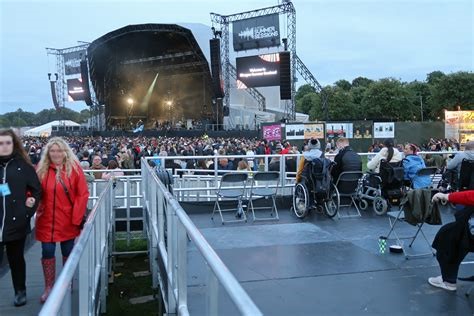
Access Denied?
The Persistent Barriers for Disabled Audiences at UK Live Music Events
DISABILITYMUSICGIGS
Clarke Geddes


Understanding Accessibility in Live Music Events
Accessibility is a fundamental aspect of ensuring that live music events are inclusive and welcoming to all audiences, particularly for individuals with disabilities. In the context of these events, accessibility encompasses various dimensions that affect the experience of disabled attendees, including venue design, ticket purchasing processes, and the availability of support services. For disabled audiences, accessibility means having the necessary provisions in place to navigate the physical and logistical challenges associated with attending live performances.
Venue design plays a pivotal role in determining accessibility. This includes features such as wheelchair ramps, accessible seating, and restrooms equipped for individuals with mobility impairments. Additionally, venues should provide clear signage and pathways that allow individuals to easily navigate both the exterior and interior spaces. Such design considerations not only comply with legal requirements but also enhance the overall experience for disabled concert-goers, ensuring they can enjoy the event without facing unnecessary barriers.
Moreover, the ticket purchasing process is another critical area for improving accessibility. It is imperative that ticketing platforms offer options for disabled patrons, such as accessible seating options and clear information about such provisions. Transparent communication regarding ticket availability for individuals with disabilities can help alleviate frustration and eliminate uncertainty, fostering an environment where all attendees feel valued and accommodated.
Support services are equally important in enhancing accessibility at live music events. These services may include trained staff who are equipped to assist individuals with disabilities and provide information on navigating the event. Additionally, compliance with legislation, such as the Equality Act 2010, which mandates accessibility for public events in the UK, is crucial. This legislation serves as a guideline for organizations to create inclusive experiences, ensuring that barriers to access are systematically addressed. By prioritizing accessibility, live music events can become truly inclusive experiences for everyone.
Common Barriers Faced by Disabled Audiences
Accessing live music events can often present a myriad of challenges for disabled audiences. Among the most prominent physical barriers are inadequate wheelchair access and the lack of accessible seating. Many venues do not possess the necessary infrastructure to accommodate those with mobility impairments, resulting in significant hurdles when trying to navigate the spaces. In some cases, venues may have designated wheelchair ramps; however, these may not connect to all areas where the event takes place, creating isolation for individuals reliant on mobility aids.
Moreover, the absence of accessible seating options poses additional complications. Attendees with disabilities often find themselves unable to secure spots that provide an unobstructed view of the performance. This situation can be exacerbated by the lack of designated seating areas for companions or caregivers, thus limiting the enjoyment and overall experience of those attending the event. It's crucial for event organizers to consider diverse seating arrangements that can accommodate various needs.
On a broader scale, systemic barriers significantly hinder the access for disabled audiences. A crucial aspect often overlooked is staff training regarding accessibility needs. Many employees at live music events may lack awareness or understanding of how to assist disabled patrons. This knowledge gap can lead to unintentional neglect or inadequate support, thereby exacerbating frustrations upon arrival. Furthermore, communication regarding available accommodations is frequently insufficient. Event organizers may fail to provide clear information on accessible features, leaving disabled individuals unaware of what safeguards are in place, ultimately discouraging them from even attempting to attend such events.
In addressing these challenges, it becomes essential for stakeholders within the live music industry to prioritize accessibility. Ensuring appropriate infrastructure, seating arrangements, staff training, and communication can foster a more inclusive environment for disabled audiences, allowing them to fully partake in the enjoyment of live music events.
The Impact of Inaccessible Events on Disabled Audiences
The lack of accessibility at live music events profoundly affects disabled audiences in various ways. Emotional and psychological consequences frequently manifest among attendees who encounter barriers. Feelings of exclusion are common as disabled fans find themselves isolated from the vibrant atmosphere that such events typically offer. Frustration can also arise when they confront systemic obstacles that render them unable to participate fully. Personal stories from disabled concert-goers underline these sentiments—many have recounted experiences where inadequate facilities or unresponsive staff left them feeling unwelcome. Such scenarios not only mar the enjoyment of the event but also suggest a broader societal neglect.
The economic implications of ignoring accessibility are not insignificant. The music industry stands to lose a substantial revenue stream by failing to accommodate disabled patrons. With an estimated 14 million disabled individuals in the UK, the potential market for live music events is significant. When venues do not prioritize accessibility, they miss out on ticket sales, merchandise purchases, and other related economic activities from this audience demographic. Concert-goers share that when accessibility options are provided, they are more likely to attend events, highlighting that investing in inclusive practices can ultimately lead to financial benefits for event organizers.
Moreover, testimonials indicate that when disabled individuals feel welcomed and supported, their loyalty to a brand or venue increases, significantly impacting future attendance rates. This, in turn, fosters a more diverse audience, enriching the cultural landscape of live music in the UK. Inaccessibility does not merely push disabled audiences away; it also prevents the music industry from leveraging the wide-ranging benefits that inclusive practices could provide. Ultimately, the persistent barriers faced by disabled concert-goers signal not only a failure of compliance with legal standards but also a missed opportunity for broader audience engagement.
Towards Inclusive Live Music Experiences: Solutions and Best Practices
Creating inclusive live music experiences for disabled audiences necessitates a multifaceted approach that begins with a thorough understanding of accessibility needs. Venue owners and event organizers are encouraged to conduct accessibility audits, which evaluate physical spaces, staff training, and customer service practices. These audits can identify barriers that might hinder disabled attendees from fully enjoying events, and provide a roadmap for improvement in the venue's infrastructure.
Furthermore, collaboration with disability advocacy groups is essential to foster an inclusive environment. By consulting these organizations, event organizers can gain insights into the specific needs of disabled individuals, ensuring that measures implemented resonate with the community. Engaging with such groups not only enhances accessibility but also builds a positive relationship with the audience, demonstrating a commitment to inclusivity.
Flexible ticketing options act as another vital aspect of accessibility. Offering various ticket types, such as companion tickets or reduced-price options for disabled attendees, can mitigate financial barriers that some may face. Moreover, providing early access to tickets for individuals with disabilities could alleviate stress during the ticketing process, thereby enhancing the overall experience from the outset.
Engaging disabled individuals in the planning process is a best practice that yields significant benefits. By including disabled voices in discussions about event planning, organizers can better understand firsthand experiences and concerns. This participatory approach fosters a sense of ownership among disabled audiences, encouraging their attendance and active participation.
Several successful models already exist within the live music sector. For instance, venues that have prioritized sensory-friendly performances or have implemented visual aids during shows have seen positive feedback and increased attendance from disabled individuals. By showcasing these inclusive practices, the industry can inspire others towards a more accessible future.
Insights
Independent journalism on disability issues in the UK.
Contact
Follow
contact@disabilitywatchuk.com
0207 8798 3081
© 2025. All rights reserved.